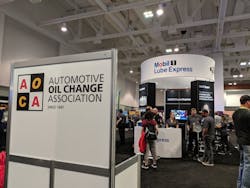LAS VEGAS, Nov. 15, 2021—One the morning of the first day of iFLEX 2021, the Automotive Oil Change Association hosted a question-and-answer panel that touched on many industry topics.
Leading the discussion was a panel that included Mark Bochnowski, of Oil Changers, Dave Everett, of Service Champ, Justin Ciallela from Victory Lane Quick Oil Change, and Tom Staker from FullSpeed Automotive.
The conversations reflected the challenges of the past year in operation, and labor shortages were high on that list. Panelists encouraged attendees to look at their onboarding and shop culture to ensure that new hires feel welcomed and current team members are valued.
“These are the kids of details that now we’re looking at on the training side," Staker said. "How do we create a culture of recognition?”
Bochnowski said that larger operators should be making regular shop visits to get a better feel for how employees work on the ground. Then, spend time thinking about how to ensure employees are able to maximize their contributions.
“I think you have to be deliberate about your team members and you culture," he said.
The panel also touched on some major topics that future iFLEX seminars would cover, including drain plug issues on Hyundai and Kia vehicles. The panel asked operators to be diligent to document complaints and claims related to these vehicles, especially if a dealer or OEM attempts to blame lube shops.
“If a dealer blames you for anything, have them put it in writing," Everett said.
The AOCA has a reporting tool on its website for these claims. The organization hopes to bring a case to the Federal Trade Commission in the future.
At end the session, Cialella addressed the overarching changes that operators are seeing. Customers expect convenience more and more with their spending, and the quick lube industry is in a great position to improve their customer experiences to meet those expectaions.
“I really think consumer expectations have changed," he said. "People are much more cognizant of the time they're spending to do things.”
About the Author
NOLN Staff Reporters
The NOLN staff reporters cover the quick maintenance industry every day, from top to bottom. For news inquiries, please contact [email protected].
